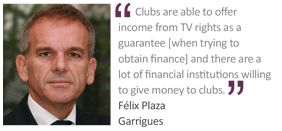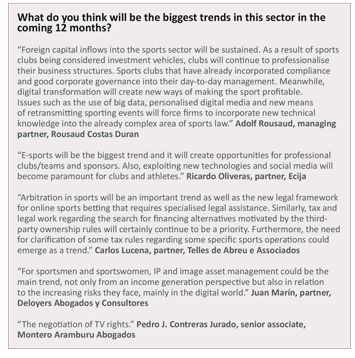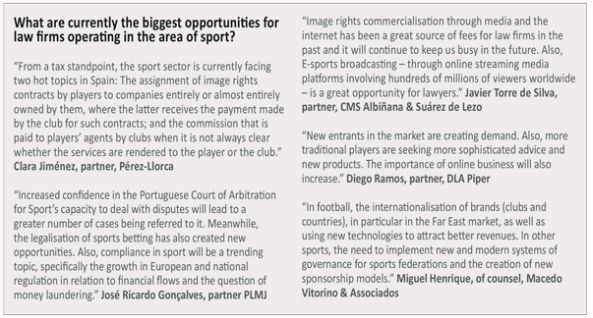The new way of negotiating TV football rights in Spain means many clubs are now considerably wealthier than they were just a few years ago – as these clubs become run in a considerably more professional manner, so opportunities for lawyers are increasing
The fact that Spanish football clubs now negotiate broadcasting rights on a collective basis – as opposed to the old regime where individual clubs agreed their own TV deals – has dramatically changed the game. Almost overnight, lesser clubs that were struggling financially under the old system saw their revenue increase substantially. Suddenly, significantly more Spanish clubs are viable entities, with the result that they are becoming attractive assets for investors. For law firms with expertise in the field of sport, opportunities are now in abundance as clubs look to professionalise their structures, ensure they are compliant with all the relevant regulations, acquire more players at a greater cost and promote their brand around the world. However, it is important to note that a "track record" in sports-related law is vital if firms wish to fully exploit these new opportunities. Lawyers point out that the world of football is a very insular one and consequently it can be difficult to win the trust of potential clients in the industry.
Cuatrecasas, Gonçalves Pereira partner Roberto Álvarez says: "This is a good moment for sport." He adds that Brexit, for example, will change the football world and will create uncertainty related to employment and tax-related issues as well as impacting on potential acquisitions of football clubs. "Brexit means there will be two markets in football, the UK market and the European market – Brexit could make things better for the European leagues," he says. Some lawyers speculate that there are also questions about whether UK football teams will continue to participate in European competitions, such as the Champions League, for example. Meanwhile, Jordi López, partner at Pintó Ruiz & Del Valle, remarks that Brexit could impact on the status of European players in the UK and raises questions about whether the English Premier League will continue to be as attractive to footballers from overseas.
Meanwhile, with the pound recently falling against the Euro following Brexit, Ignacio Legido, managing partner of the legal division at BDO Abogados, says Spanish football clubs could be given a boost in that it could increase their chances of buying footballers from English clubs. In addition, another Brexit-related issue is that, if the UK does leave the European Union, its tax regime could change and lawyers are speculating that the new regime could discriminate against overseas footballers playing in the UK.

Hot property
There are many investors interesting in buying football clubs, which will present opportunities for law firms, according to Álvarez. He adds that E-sport (also known as electronic sports or professional video gaming) is another growing area of practice, which raises issues including whether E-sport should be regulated in the same way as other professional sports, as well as employment matters related to teams employing professional gamers. Legido also highlights the potential of E-sport, "a new market inside the sports world".
Advising on EU and competition law issues affecting footballers is another big opportunity for law firms, according to Roberto Vallina, senior associate at Roca Junyent. Meanwhile, lawyers also identify tax issues as a source of work – earlier this year, one of the best players in the world, FC Barcelona's Lionel Messi, was sentenced to 21 months in prison for tax fraud, though he has appealed against the sentence. Meanwhile, López says that, with the recent changes to the rules governing the sale of football broadcasting rights in Spain, many football clubs in the country have doubled their income and this also represents an opportunity for the law firms that advise clubs.
The growing popularity of Spanish football around the world could also generate more work for M&A lawyers. More international investors, particularly investors from China, are becoming increasingly interested in acquiring Spanish football clubs. Meanwhile, López says football-related litigation is a big opportunity for Spanish law firms given that the same regulations govern football around the world. "The international environment is uniform, it is enacted by international federations, so Spanish lawyers can represent Chinese clubs, for example, in this respect, though in some cases, the assistance of local lawyers is needed," he adds.
Lenders keen
Garrigues partner Félix Plaza says the centralisation of TV football rights in Spain – meaning that La Liga sells the rights as a single entity, rather than individual clubs negotiating their own deals as used to be the case – together with the strict rules on Financial Fair Play introduced by La Liga, has reduced the debt of many clubs and means that they are finding it easier to access finance. "Clubs are able to offer income from TV rights as a guarantee [when trying to obtain finance] and there are a lot of financial institutions willing to give money to clubs," he adds. Plaza says this creates a lot of opportunities for law firms to advise on the clubs' acquisition of players or the international expansion of Spanish clubs. "Spanish clubs need to sell their product abroad and this means they need advice on the brand itself, digital platforms, and e-commerce," he explains.
Tax is also an increasingly important issue in sport, Plaza says. "The tax authorities are putting enormous pressure on individual players and clubs, some tax structures that fit within the legal framework are being considered tax evasion – more legal security would be highly recommended," he adds. Lawyers argue that people working in sport at all levels are increasingly aware of the importance of complying with laws, whether that be the promoters of sport, the clubs, or managers. One partner at a leading Spanish firm says: "A lot of parties in sport in Spain thought tax was not important, but they now believe they have to invest in a good law firm to avoid future risk and this is a good thing for major law firms."
Illegal streaming
Litigation related to pirate websites broadcasting sports events is another source of work for law firms, according to Bird & Bird of counsel Raúl Bercovitz. "The number of websites providing illegal streaming is increasing," he says. Bercovitz adds that this trend could partly explain why viewing figures for Sky Sports' live Premier League matches in the UK has fallen 19 per cent this season. "The problem is that the quality of broadcasts on the streams is not bad enough [to encourage people to buy subscriptions to the legal TV packages] and for the owners of the rights, this is a big problem," he says. "Even if you litigate against a pirate website, new pirate websites will appear – some suggest it is not effective to sue pirate websites because if a website is domiciled in Hong Kong, for example, it's difficult to bring it to Spanish courts. Now the question is should the intermediaries (for example, telecoms companies) be sued in order to make them cease giving access to these pirate websites."
Álvarez says that the sports practices at around 90 per cent of law firms in Spain focus on football, so there are opportunities in other sports, such as motorsport where services can be provided to teams, riders/drivers and promoters. He adds: "Motorsport is a global sport so lawyers with an international approach are needed as there are different jurisdictions and different tax frameworks involved." Lawyers have also identified 'street sport' as a massive growth area: "Public racing/running is now a major industry," says one partner.
Clients in the sport industry increasingly want lawyers who are highly specialised in areas such as EU and competition law, while having a "sensitivity" to the needs of clients that operate in sport, according to Vallina. He adds that there are also opportunities for law firms to advise on competition matters in relation to "state aid to football clubs". Another partner remarks that acting as agents to football players is also an opportunity for law firms: "The agents of football players are not really professional; the risk for the players is that, with transfers involving a lot of money, players could have problems with the tax authorities." However, the partner adds that some agencies representing footballers are becoming increasingly sophisticated with some recruiting in-house counsel.

Third party ownership ban
There is the potential for international federations to come into conflict with laws in different jurisdictions, according to one partner at a major Spanish firm. He cites the example of UEFA's ban on third-party ownership of professional football players' contracts as a ruling that comes into conflict with national laws. The partner also cites the example of FIFA wanting rules applied that "come into conflict with the principle of the free movement of people". He adds: "In many fields, they [sporting federations] are regulating things they shouldn´t be regulating."
Women's sport is another booming area. "In the next two years, women's sport will increase and there will be more investment in women's sport," says one partner. He adds that there are a number of issues in women's sport which could lead to legal challenges and cites the example of some professional sportswomen's contracts including clauses that stipulate the contract will be terminated if she becomes pregnant. Meanwhile, sports stadium naming rights is expected to be a major growth area: "Eighty per cent of Spanish clubs are not exploiting stadium naming rights, but in two years, 90 per cent of them will be." Cuatrecasas, Gonçalves Pereira associate Teresa Méndez Flórez says sport-related sponsorship is a major growth area for law firms: "Investment in sport sponsorship is growing and this is one area where we are focusing our attention." EU and competition law issues are common in sport, according to Vallina. He highlights restrictions imposed by international sporting federations and says they will be an issue in the future. For example, he highlights "EU individual athletes being prohibited from competing in another EU member state's national championship, bans on athletes competing in non-federation events, or the creation of European competitions such as the Basketball Euroleague" and adds that these matters might be particularly contentious.
With football clubs significantly boosting their income as a result of the new method of negotiating TV rights, lawyers predict that this could result in more business for law firms. However, it is not a foregone conclusion that all firms will dramatically boost their sport-related income. As one partner says: "There is a reluctance on the part of clubs and federations to try new things – many big law firms are trying to build new sports teams, but the world of football is very closed and it is a market in which trust is of the utmost importance."
Portugal: Financing football
Football club financing is creating opportunities for law firms in Portugal, according to Paulo Farinha Alves, partner at PLMJ. He adds: "Other factors that have contributed to the growth in work are the increasing complexity of players' transfer rights, television broadcast rights, sports betting and advertising, and the complexity of domestic and European regulations and the related litigation and arbitration issues concerning these areas." Contractual issues are also generating work for lawyers, says Farinha Alves. "For example, how to make long contractual obligations compatible with clauses providing for high release fees to protect the clubs."
Vieira de Almeida associate António Mendes de Almeida says Portuguese lawyers currently have an opportunity to develop traditional sports-related work such as advising clubs, sports associations and professional leagues, players, agents, investors and governing bodies on day- to-day operations, in particular regarding regulatory and contractual matters (with the emphasis on sponsorship and media), but also funding and debt restructuring. He adds: "We believe that there is a growing trend among clubs, sports associations/professional leagues and other sports entities to reduce their internal legal departments and outsource legal work to full-service law firms with strong sports law practices." Mendes de Almeida also says changes to FIFA rules that allow any person to act as a player's agent represents an opportunity for law firms as does online betting and E-sports.
The major development in sport in Portugal in the last 12 months from a legal perspective was the Sports Arbitration Court becoming fully operational, according to Abreu Advogados partner Fernando Veiga Gomes. Meanwhile, at international level, Veiga Gomes adds that the major change was the acquisition of "many football clubs by funds and investors as a result of the FIFA ban on third-party ownership of economic rights of football players". He says: "Those investors are now looking for investment opportunities in football clubs and in Portugal it is still a lesser investment compared to the five big European football leagues."
Sport is indeed a growing area for law firms, says Rui Vaz Pereira, associate at Cuatrecasas, Gonçalves Pereira in Lisbon. "The football industry has been consistently growing over the last two decades," he adds. "For instance, between 1995 and 2011, the number of football transfers in the EU has been multiplied by 3.2 while the total value of transfer fees has been multiplied by 7.4, reaching the record figure of €3 billion." Diogo Leote Nobre, partner at Miranda says football-related advice generates the vast majority of sport-related work for lawyers. He highlights issues relating to relations between clubs, players and coaches in the context of player transfers, as well as disputes involving governing bodies. Leote Nobre says: "Football is expected to remain responsible for the vast majority of instructions."

The content of this article is intended to provide a general guide to the subject matter. Specialist advice should be sought about your specific circumstances.
